
As parents, watching our children grow and navigate the complexities of the world around them is a journey filled with joy, challenges, and learning opportunities. One critical aspect of their development that often goes unnoticed but plays a significant role in their daily lives is the concept of executive function. This guide aims to shed light on what executive function is, delve into the basics of brain anatomy, identify children who might struggle with it the most, and offer three practical strategies to support your child’s development.
What is Executive Function?
Executive function refers to a set of cognitive processes that enable us to successfully plan, focus attention, remember instructions, and juggle multiple tasks. Think of it as the brain’s command centre. It guides behaviours like impulse control, emotional regulation, problem-solving, and setting and achieving goals. Developing strong executive function skills is crucial for children’s academic success, social relationships, and overall well-being.
A Brief Look at Brain Anatomy
The brain’s frontal lobe, located just behind the forehead, plays a pivotal role in executive function. This brain area is responsible for high-order functions such as decision-making, problem-solving, and regulating emotions. It’s like an orchestra conductor, ensuring that various sections of the brain work together harmoniously to execute complex tasks.
Who Struggles with Executive Function?
Children with attention-deficit/hyperactivity disorder (ADHD) and dyslexia often face significant challenges with executive function. ADHD can make it hard for kids to stay focused, control impulses, and keep information readily accessible in their minds. Dyslexic children might struggle with tasks that require working memory and processing speed, making reading and related activities particularly challenging. Recognizing these difficulties early on can lead to interventions that significantly improve a child’s quality of life and learning outcomes. Anxiety can also considerably impact these cognitive processes. Anxiety, a common emotional challenge faced by many children, can disrupt executive function in several ways, making it harder for kids to concentrate, remember instructions, and manage their tasks effectively.
The Link Between Anxiety and Executive Function
Anxiety can consume a significant amount of mental energy, leaving less capacity for the brain’s executive functions. When a child is anxious, their brain is often in a heightened state of alert, focusing on potential threats or worries. This state can detract from their ability to allocate cognitive resources to tasks that require planning, working memory, and flexible thinking. Here’s how anxiety specifically affects executive function:
- Impaired Working Memory: Anxiety can overload the brain’s working memory, the function responsible for holding and manipulating information in the short term. When anxious, children may find it harder to keep track of instructions or follow multi-step directions because their worries consume their mental resources.
- Reduced Cognitive Flexibility: Children struggling with anxiety often have difficulty shifting their attention from their internal worries to the task at hand. This can make it challenging for them to adapt to routine changes, switch between tasks, or consider alternative solutions to problems, which are critical components of executive function.
- Difficulty with Inhibition Control: Anxiety can make it hard for children to regulate their emotional responses and behaviours. They might act impulsively or have trouble stopping themselves from focusing on negative thoughts, which can interfere with their ability to engage in goal-directed activities.
Three Essential Strategies for Supporting Executive Function
- Establish Routines: Creating consistent daily routines helps children develop a sense of stability and predictability. This practice supports time management skills and reduces the cognitive load of remembering what comes next, allowing them to focus more on the task.
- Break Tasks into Smaller Steps: Large or complex tasks can be overwhelming. Teaching your child to break down tasks into manageable steps can significantly enhance their ability to start and complete tasks. This approach fosters a sense of accomplishment and reduces the anxiety associated with big projects.
- Use Visual Aids: Visual schedules, charts, and graphic organizers can be powerful tools for children who struggle with executive function. These aids help them visualize their tasks, plan their day, and transition more smoothly between activities. Visual reminders can also boost their memory and attention to detail.
Maximising Your Child’s Potential
Understanding and supporting the development of executive function in children aged 8-12 is a critical component of parenting. By recognizing the signs of struggle early and implementing supportive strategies, you can give your child the tools they need to navigate the challenges of growing up. Remember, each child is unique, and what works for one may not work for another. Patience, persistence, and a lot of love and support are key to helping your child develop these essential life skills.
For parents navigating the complexities of executive function challenges, remember that you’re not alone. Many resources are available to help you and your child thrive. By focusing on establishing routines, breaking tasks into smaller steps, and utilizing visual aids, you can make a significant positive impact on your child’s ability to manage and overcome these challenges.
Unleash is a tool that addresses anxiety and its impact on executive function. It offers science-backed resources and practical strategies to manage anxiety, enhance self-worth, and improve problem-solving skills. This experiential journal incorporates cognitive behaviour psychology and the latest neuroscience to create a personalized journey. It helps children understand their thoughts, feelings, behaviours, and interconnectedness.
By teaching relaxation strategies and fostering bravery, “Unleash” supports children in taking control of their anxiety, thus potentially improving their executive function skills.
For more detailed information on how “Unleash” can help your child manage anxiety and support executive function development, visit Unleash Journal.

Related Articles
How to Improve Self-regulation in Children with Autism and Attention Disorders
Supporting Your Child with ADHD: Insights into Their Unique Brain Structure
7 Powerful Strategies To Help Your Child Balance Their Brain Budget




